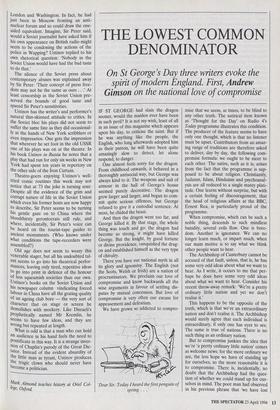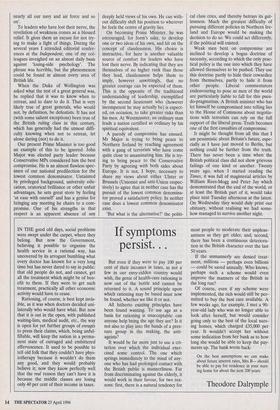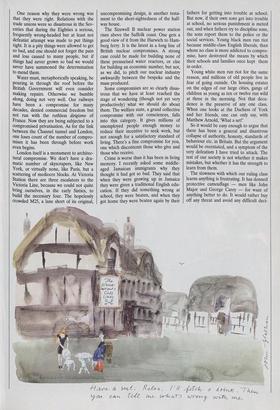THE LOWEST COMMON DENOMINATOR
On St George's Day three writers evoke the
spirit of modern England. First, Andrew Gimson on the national love of compromise
IF ST GEORGE had slain the dragon sooner, would the maiden ever have been in such peril? It is not my wish, least of all in an issue of this magazine which appears upon his day, to criticise the saint. But if he was anything like the people, the English, who long afterwards adopted him as their patron, he will have been quite amazingly slow to detect, let alone respond, to danger. One almost feels sorry for the dragon. From childhood onwards, it behaved in a thoroughly antisocial way, but George was always kind to it. The weapons and suit of armour in the hall of George's house seemed purely decorative. The dragon grew larger and larger, and began to com- mit quite serious offences, but George refused to give it a custodial sentence. At most, he chided the beast.
And then the dragon went too far, and George killed it. By that stage, the whole thing was touch and go: the dragon had become so strong, it might have killed George. But the knight, by good fortune or divine providence, vanquished the drag- on and established himself as the very type of chivalry.
There you have our national myth in all its glory and ignominy. The English (not the Scots, Welsh or Irish) are a nation of procrastinators. We proclaim our love of compromise and know backwards all the wise arguments in favour of settling dis- putes by mutual concession. But love of compromise is very often our excuse for appeasement and defeatism.
We have grown so addicted to compro- `Dear Sir. Today I heard the first penguin of spring . mise that we seem, at times, to be blind to any other truth. The satirical item known as 'Thought for the Day' on Radio 4's Today programme illustrates this condition. The producer of the feature seems to have only one thought, which is that no listener must be upset. Contributors from an amaz- ing range of traditions are therefore asked to deliver, day by day, the following com- promise formula: we ought to be nicer to each other. The satire, such as it is, arises from the fact that the programme is sup- posed to be about religion. Christianity, Judaism, Islam, Hinduism and psychoanal- ysis are all reduced to a single matey plati- tude. One learns without surprise, but with a certain feeling of discouragement, that the head of religious affairs at the BBC, Ernest Rea, is particularly proud of the programme.
When compromise, which can be such a noble thing, descends to such mindless banality, several evils flow. One is bore- dom. Another is ignorance. We can no longer learn much, or impart much, when our main motive is to say what we think other people want to hear.
The Archbishop of Canterbury cannot be accused of that fault, unless, that is, he has some very odd ideas about what we want to hear. As I write, it occurs to me that per- haps he does have some very odd ideas about what we want to hear. Consider his recent throw-away remark: 'We're a pretty ordinary little nation and yet we don't realise it.'
This happens to be the opposite of the truth, which is that we're an extraordinary nation and don't realise it. The Archbishop would surely agree that each individual is extraordinary, if only one has eyes to see. The same is true of nations. There is no such thing as an ordinary nation.
But to compromise junkies the idea that we're 'a pretty ordinary little nation' comes as welcome news; for the more ordinary we are, the less hope we have of standing up for ourselves, so the more reasonable it is to compromise. There is, incidentally, no doubt that the Archbishop had the ques- tion of whether we could stand up for our- selves in mind. The poor man had observed in his previous phrase that 'we have lost nearly all our navy and air force and so on'.
To leaders who have lost their nerve, the revelation of weakness comes as a blessed relief. It gives them an excuse for not try- ing to make a fight of things. During the several years I attended editorial confer- ences at the Independent, one of my col- leagues inveighed on an almost daily basis against losing-side psychology'. The phrase was horrible, but the phenomenon could be found in almost every area of British life.
When the Duke of Wellington was asked what the test of a great general was, he replied that it was to know when to retreat, and to dare to do it. That is very likely true of great generals, who would not, by definition, be defeatists. It has not (with some salient exceptions) been true of the British ruling class in this century, which has generally had the utmost diffi- culty knowing when not to retreat, let alone daring (not) to do it.
Our present Prime Minister is too good an example of this to be ignored. John Major was elected party leader because Conservative MPs considered him the best compromise. He is an almost flawless spec- imen of our national predilection for the lowest common denominator. Untainted by privileged background, university edu- cation, oratorical brilliance or other unfair advantages, he sets great store by feeling `at ease with oneself' and has a genius for bringing any meeting he chairs to a com- promise. One of his strengths in that respect is an apparent absence of any deeply held views of his own. He can with- out difficulty shift his position to wherever he feels the centre of gravity lies.
On becoming Prime Minister, he was encouraged, for form's sake, to develop one or two ideas of his own, and hit on the concept of classlessness. His choice is instructive, for here is another valuable source of comfort for leaders who have lost their nerve. By indicating that they are themselves of no higher rank than those they lead, classlessness helps them to imply, however unwittingly, that no greater courage can be expected of them. This is the opposite of the traditional understanding of leadership, exemplified by the second lieutenant who (however incompetent he may actually be) is expect- ed, on occasion, to take greater risks than his men. At Westminster, an ordinary man leads a nation certified as ordinary by his spiritual equivalent.
A parody of compromise has ensued. Mr Major is trying to bring peace to Northern Ireland by reaching agreement with a gang of terrorists who have come quite close to assassinating him. He is try- ing to bring peace to the Conservative Party by agreeing with both sides about Europe. It is not, I hope, necessary to share my views about either Ulster or Brussels (Unionist and anti-Union respec- tively) to agree that in neither case has the pursuit of the lowest common denomina- tor proved a satisfactory policy. In neither case does a lowest common denominator exist.
`But what is the alternative?' the politi- cal class cries, and thereby betrays its gut- lessness. Much the greatest difficulty of pursuing different policies in Northern Ire- land and Europe would be making the decision to do so. We could act differently, if the political will existed.
Weak men bent on compromise are inclined to develop a bogus doctrine of necessity, according to which the only prac- tical policy is the one into which they have allowed themselves to be pushed. They use this doctrine partly to hide their cowardice from themselves, partly to hide it from other people. Liberal commentators endeavouring to pose as men of the world are particularly liable to fall for this pseu- do-pragmatism. A British minister who has let himself be compromised into telling lies to the House of Commons about negotia- tions with terrorists can rely on the full support of the liberal press. Truth becomes one of the first casualties of compromise.
It might be thought from all this that I am pessimistic about Britain's future, espe- cially as I have just moved to Berlin, but nothing could be further from the truth. There has never been a time when the British political class did not show grievous failings of one kind or another. Twenty years ago, when I started reading the Times, it was full of magisterial articles by William Rees-Mogg and Peter Jay which demonstrated that the end of the world, or at least the British part of it, would take place next Tuesday afternoon at the latest. On Wednesday they would duly print our obituary, without realising we had some- how managed to survive another night. One reason why they were wrong was that they were right. Relations with the trade unions were so disastrous in the Sev- enties that during the Eighties a serious, frequently wrong-headed but at least not defeatist attempt was made to put things right. It is a pity things were allowed to get so bad, and one should not forget the pain and loss caused to many people, but if things had never grown so bad we would never have summoned the determination to mend them.
Water must, metaphorically speaking, be pouring in through the roof before the British Government will even consider making repairs. Otherwise we bumble along, doing not very well. Our railways have been a compromise for many decades, denied commercial freedom but not run with the ruthless dirigisme of France. Now they are being subjected to a compromised privatisation, As for the link between the Channel tunnel and London, one loses count of the number of compro- mises it has been through before work even begins.
London itself is a monument to architec- tural compromise. We don't have a dra- matic number of skyscrapers, like New York, or virtually none, like Paris, but a scattering of mediocre blocks. At Victoria Station there are three escalators to the Victoria Line, because we could not quite bring ourselves, in the early Sixties, to build the necessary four. The hopelessly crowded M25, a lane short of its original, uncompromising design, is another testa- ment to the short-sightedness of the half- way house.
The Sizewell B nuclear power station rises above the Suffolk coast. One gets a good view of it from the Harwich to Ham- burg ferry. It is the latest in a long line of British nuclear compromises. A strong case could be made for building none of these pressurised water reactors, or else for building an economic number, but not, as we did, to pitch our nuclear industry awkwardly between the bespoke and the mass produced. Some compromises are so clearly disas- trous that we have at least reached the stage of wondering (though not yet very productively) what we should do about them. The welfare state, a grand collective compromise with our consciences, falls into this category. It gives millions of unemployed people enough money to reduce their incentive to seek work, but not enough for a satisfactory standard of living. There's a fine compromise for you, one which discontents those who give and those who receive.
Crime is worse than it has been in living memory. I recently asked some middle- aged Jamaican immigrants why they thought it had got so bad. They said that when they were growing up in Jamaica they were given a traditional English edu- cation. If they did something wrong at school, they were beaten, and when they got home they were beaten again by their fathers for getting into trouble at school. But now, if their own sons get into trouble at school, no serious punishment is meted out, and when fathers try to discipline sons, the sons report them to the police or the social services. Young black men run riot because middle-class English liberals, than whom no class is more addicted to compro- mise, have destroyed the means by which their schools and families once kept them in order.
Young white men run riot for the same reason, and millions of old people live in fear of going outside. On housing estates on the edges of our large cities, gangs of children as young as ten or twelve run wild at three in the morning. Not that deca- dence is the preserve of any one class. When one looks at the Duchess of York and her friends, one can only say, with Matthew Arnold, What a set!'
So it would be easy enough to argue that there has been a general and disastrous collapse of authority, honesty, standards of behaviour etc. in Britain. But the argument would be overstated, and a symptom of the very defeatism I have tried to attack. The test of our society is not whether it makes mistakes, but whether it has the strength to learn from them.
The slowness with which our ruling class learns anything is frustrating. It has donned protective camouflage — men like John Major and George Carey — for want of anything better to do. It would rather buy off any threat and avoid any difficult deci-




























































 Previous page
Previous page